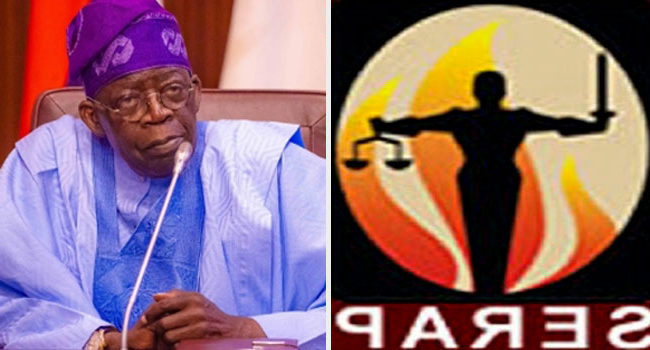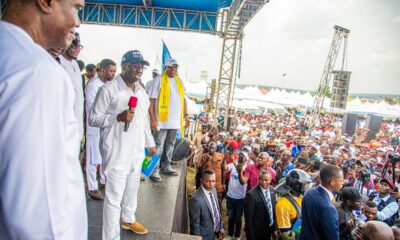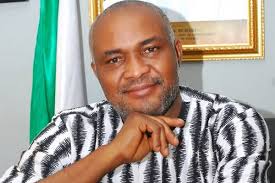NEWS
SERAP Calls Out Tinubu On Loan Agreements By Former Presidents

The Socio-Economic Rights and Accountability Project (SERAP) has urged President Bola Tinubu “to direct appropriate ministries, departments and agencies (MDAs) to provide our organization with copies of the loan agreements obtained by the governments of former presidents Olusegun Obasanjo, Umaru Musa Yar’Adua, Goodluck Jonathan and Muhammadu Buhari.”
In a statement made available to Biztellers, the SERAP also sought “the spending details of any such loans as well as the interests and other payments so far made on the loans.”
In addition, the SERAP urged President Tinubu “to establish an independent audit on the spending of the loans obtained by the governments of the former presidents, and to make public the findings of any such audit.”
The call was detailed in the Freedom of Information (FOI) request dated 13 April 2024 and signed by SERAP deputy director Kolawole Oluwadare.
The not-for-profit said, “Publishing copies of the agreements would prevent and combat waste, corruption, mismanagement, and abuse in the spending of public funds.
“No one should be able to pull curtains of secrecy around decisions on the spending of public funds which can be revealed without injury to the public interest. Democracy requires accountability and accountability requires transparency.”
According to the SERAP, “Nigerians are entitled to information about what their government is doing in their name. This is part of their right to information.”
The FOI request, read in part, “Nigerians’ right to a democratic governance allows them to appreciably influence the direction of government, and have an opportunity to assess progress and assign blame.
“The accountability of government to the general public is a hallmark of democratic governance, which Nigeria seeks to achieve.
“Your government should make it possible for citizens to have access to the agreements and spending details to judge whether their government is working for them or not.
“Publishing the agreements would demonstrate your oft-expressed commitment to openness in government and to promote accountability. It would also improve public accountability in ministries, departments and agencies (MDAs).
“Publishing the agreements and spending details would allow the public to see how and on what these governments spent the loans and foster transparency and accountability.
“The information may help to explain why, despite several billions of dollars in loans obtained by successive governments, millions of Nigerians continue to face extreme poverty and lack access to basic public goods and services.
“Providing us with copies of the loan agreements signed by the governments of former presidents Olusegun Obasanjo, Umaru Musa Yar’Adua, Goodluck Jonathan and Muhammadu Buhari, and widely publishing the agreements would allow Nigerians to scrutinise it and to demand accountability for the spending of the loans.
“We would therefore be grateful if the recommended measures are taken within seven days of the receipt and/or publication of this letter. If we have not heard from you by then, SERAP shall take all appropriate legal actions to compel your government to comply with our request in the public interest.
“Our requests are brought in the public interest, and in keeping with the requirements of the Nigerian Constitution 1999 [as amended], the Freedom of Information Act, and the UN Convention against Corruption, the International Covenant on Civil and Political Rights and the African Charter on Human and Peoples’ Rights to Nigeria is a state party.
“According to Nigeria’s Debt Management Office, the total public domestic debt portfolio for the country’s is N97.3 trillion ($108 billion). The Federal Government’s debt is N87.3 trillion ($97 billion).
“Nigeria paid $6.2 billion in 2019 as interest on loans while the country paid $6.5 as interest in 2018. Nigeria also paid $5 billion as interest on loans in 2017 while the country paid $4.4 billion as interest in 2016. For 2015, the interest paid on loans was $5.5 billion.
“SERAP is seriously concerned that substantial parts of the loans obtained by successive governments since the return of democracy in 1999 may have been mismanaged, diverted or stolen, and in any case remain unaccounted for.
“Publishing copies of the agreements would also ensure that persons with public responsibilities are answerable to the people for the performance of their duties including the management of the loans obtained between May 1999 and May 2023.
“Your government has a responsibility to ensure transparency and accountability in how any loans obtained by the Federal Government are spent, to reduce vulnerability to corruption and mismanagement.
“The Freedom of Information Act, Section 39 of the Nigerian Constitution, article 9 of the African Charter on Human and Peoples’ Rights and article 19 of the International Covenant on Civil and Political Rights guarantee to everyone the right to information, including to copies of the loan agreements obtained by successive governments since 1999.
“By the combined reading of the provisions of the Constitution of Nigeria, the Freedom of Information Act 2011, the International Covenant on Civil and Political Rights, and the African Charter on Human and Peoples’ Rights, there are transparency obligations imposed on your government to widely publish the agreements and details of the projects on which the loans were spent.
“The Nigerian Constitution, Freedom of Information Act, and the country’s anti-corruption and human rights obligations rest on the principle that citizens should have access to information regarding their government’s activities.”
International News
Gabonese Voters Head To Polls In First Presidential Election Since 2023 Coup
Gabonese citizens lined up at polling stations on Saturday to cast their votes in a landmark presidential election, the first since the military ousted the Bongo dynasty in a coup last August.
Eight candidates are vying for the top job, but all signs point to junta leader General Brice Oligui Nguema — the man behind the August 30, 2023, coup — emerging as the frontrunner.
Oligui, who toppled Ali Bongo and ended 55 years of family rule widely criticized for corruption and economic mismanagement, has dominated opinion polls in the run-up to the vote.
In the capital, Libreville, snaking queues formed outside polling stations as voters turned out early.
READ MORE: Gabon Extends Investment Offer To Dangote Amid Nigerian Attacks
Among them was 30-year-old Aurele Ossantanga Mouila, who cast his ballot for the first time after finishing a night shift at a casino.
“I did not have confidence in the earlier regime,” Mouila told reporters, echoing the sentiments of many young voters hoping for change in the oil-rich central African nation.
Oligui, who served as transitional president while civilians drafted a new constitution, swapped his military uniform for campaign attire as he seeks a seven-year mandate.
He faces seven challengers, including his main rival, former Prime Minister Alain-Claude Bilie By Nze, a longtime insider under Ali Bongo who now brands himself as the face of a “complete rupture” from the past.
Despite Oligui’s promises of reform, critics question his commitment to breaking with the old system, noting his deep ties to the Bongo era.
His campaign slogan, “C’BON” — a clever wordplay blending his initials with the French phrase for “It’s good” — has been plastered across Libreville, while rival candidates struggle for visibility.
As roughly 920,000 registered voters cast their ballots, the election is taking place against a backdrop of pressing national issues.
High unemployment, failing infrastructure, regular power outages, and soaring government debt — projected to reach 80 percent of GDP this year — have fueled public frustration.
Analysts, like political observer Neyer Kenga, say the vote represents a critical test for Gabon’s return to civilian rule and constitutional order.
“Today all Gabonese are firmly in favour of a democratic game that is played within the rules,” Kenga noted, adding that the outcome remains uncertain in a nation scarred by post-election violence in 2009 and 2016, as well as last year’s coup.
The interior ministry has pledged a “transparent ballot” and results are expected by Monday. Meanwhile, Oligui remains confident of victory.
“The builder is here, the special candidate, the one you called,” he declared at his final rally, as music and dancing filled the streets of Libreville.
NEWS
‘Hands Off Our Campus!’ — NANS Warns SSANU Over Protest Threats At FUOYE
The National Association of Nigerian Students (NANS), Southwest Zone D, has cautioned the Senior Staff Association of Nigerian Universities (SSANU) against actions capable of disrupting academic activities at the Federal University Oye Ekiti (FUOYE).
In a statement released on Saturday in Ado Ekiti, the student body condemned what it described as “veiled threats” by SSANU Western Zone to mobilize its members for industrial action or protest at FUOYE, following the university’s handling of a sexual harassment allegation against the institution’s Vice Chancellor, Prof. Abayomi Fasina.
The controversy stems from an extraordinary meeting of FUOYE’s Governing Council, which exonerated Prof. Fasina of the sexual misconduct allegation, while two local SSANU leaders were found guilty of misconduct.
READ MORE: NANS Demands Probe Into NYSC’s Non-Payment Of N77,000 Allowance
The council directed the implicated unionists to issue written apologies and undertakings to abide by university regulations within seven days, although their suspensions were lifted, with a forfeiture of half salaries for the period under review.
In reaction, SSANU’s National Vice President for the Western Zone, Abdussobur Salaam, rejected the council’s decision and announced plans to mobilize union members across 26 universities for a possible industrial action until their demands were addressed.
Responding, NANS leaders Taiwo Owolewa (Coordinator), Olutunde Oluwole (General Secretary), and Eromidayo Kuku (Public Relations Officer) warned that any attempt to destabilize the academic environment would be met with firm resistance from the student body.
“Nigerian students and the entire NANS structure in the South-West and beyond will resist such moves with even greater mobilization across our over 70 tertiary institutions comprising more than 300,000 students,” the statement read.
They emphasized that students would not stand idly by and allow any group or union to jeopardize the academic future of over 50,000 students at FUOYE.
“This is not a threat; this is a declaration of readiness to protect the academic future of Nigerian students. FUOYE or any of our institutions in Southwest is not a battleground for political vendettas or union showdowns,” the student leaders asserted.
While urging SSANU to seek lawful and peaceful avenues to resolve grievances, NANS also called on stakeholders to step in and prevent any action that could compromise the stability of the institution.
Additionally, the association aligned itself with the conclusions of the university panel that cleared the Vice Chancellor of wrongdoing, citing corroboration from both the Nigeria Police Force and the testimonies of the concerned parties.
“Our foremost concern remains the welfare of students,” NANS stated, endorsing the Governing Council’s plans to establish a Peace and Reconciliation Committee as well as onboarding and reorientation programmes aimed at fostering a positive institutional culture.
NEWS
Drop Akpabio’s Petition, Probe Threats Against My Life – Senator Natasha To IGP
Suspended Senator representing Kogi Central, Natasha Akpoti-Uduaghan, has urged the Inspector General of Police, Kayode Egbetokun, to disregard a petition filed against her by Senate President Godswill Akpabio and instead open a thorough investigation into allegations of threats to her life.
Akpabio had accused the embattled senator of defamation and incitement, following claims that he was involved in an alleged plot to assassinate her.
READ ALSO: Sen. Natasha Moves To Disbar Senate Ethics Chairman
Describing the allegations as “heinous lies,” Akpabio insisted they were designed to damage his reputation and stir public unrest.
Reacting through a statement released by her lawyer, Victor Giwa, Akpoti-Uduaghan dismissed the Senate President’s petition as an attempt to distract law enforcement from investigating the real issues.
“It is our client’s position that the Senate President should submit himself for a full investigation to security agents before any allegation of incitement against him,” the statement read.
Giwa went further to accuse Akpabio of trying to avoid scrutiny by raising counter-allegations, claiming that the Senate President was the “principal suspect” in the matter and had allegedly ordered the withdrawal of Akpoti-Uduaghan’s security.
The statement argued that Akpabio’s petition could only be considered after the allegations against him had been properly investigated and proven false.
“We therefore call on the Senate President to submit himself to full investigation rather than divert the attention of the security agents through a bubble petition,” Giwa stated.
“It is only when the investigation has been concluded, and the allegation has been shown to be false, that the issue of incitement and false allegation against Senator Natasha can be entertained.
“We therefore call on the Inspector General of Police to discontinue the Senate president’s Petition as being diversionary and prejudicing of investigation,” the statement concluded.



















